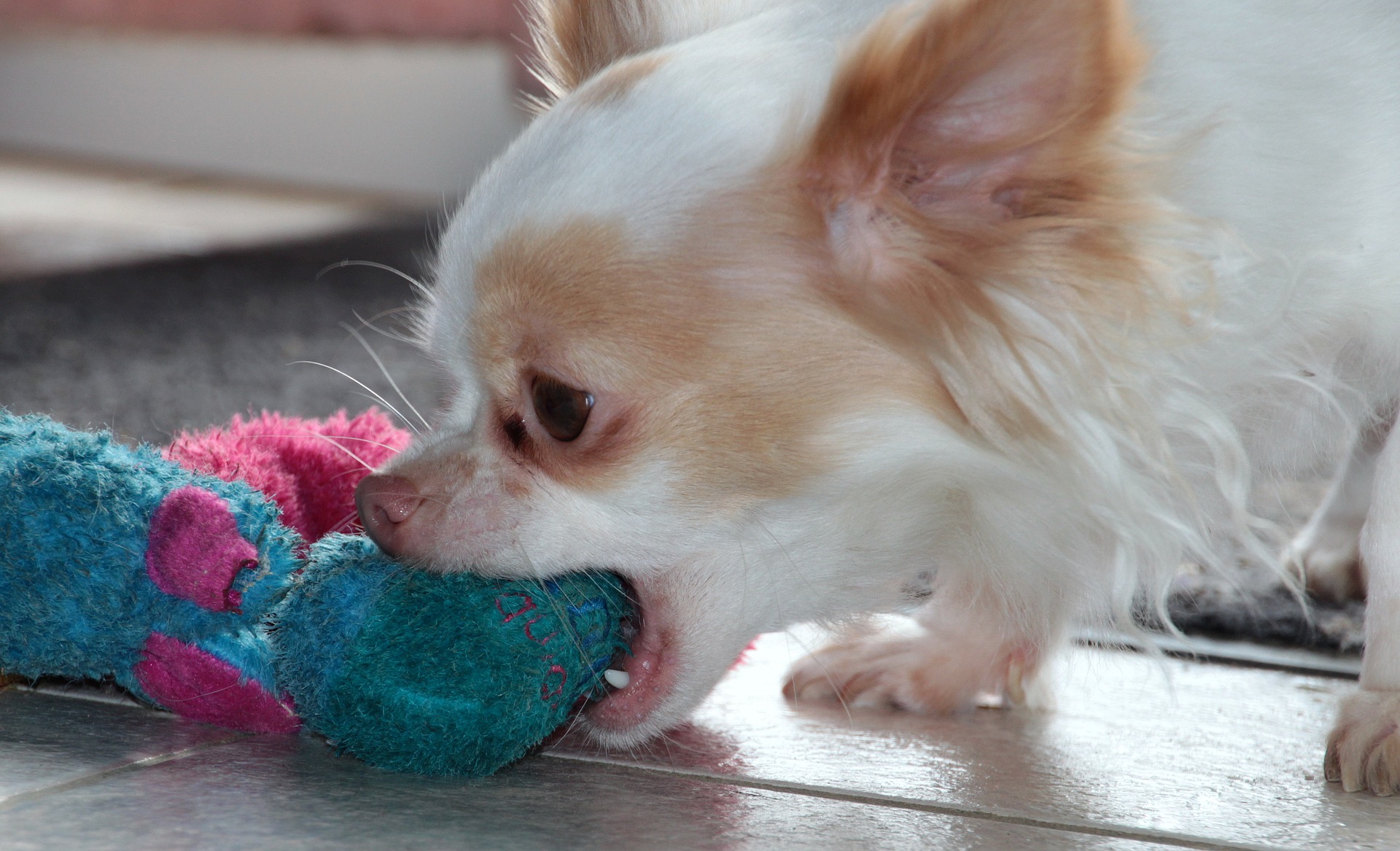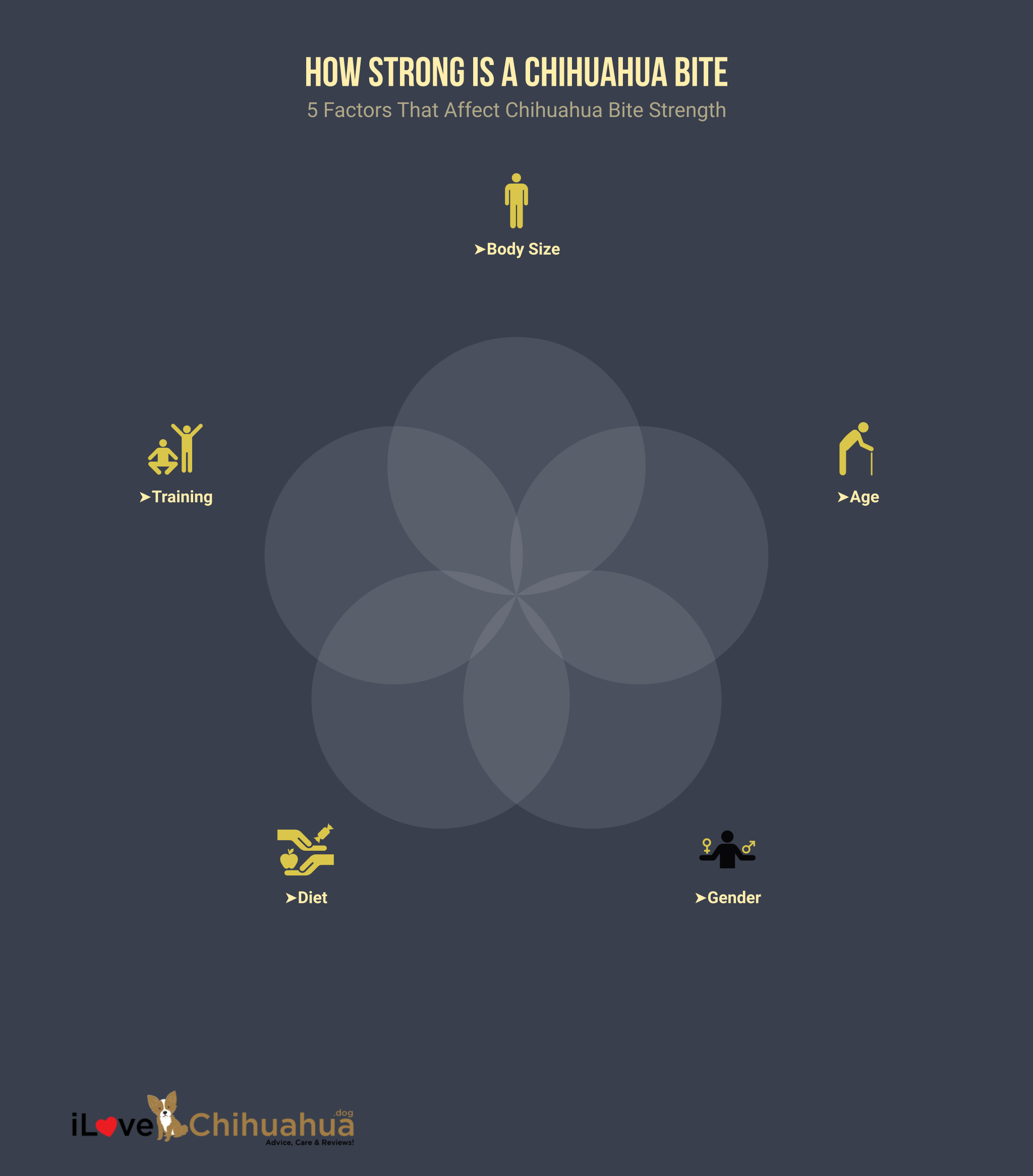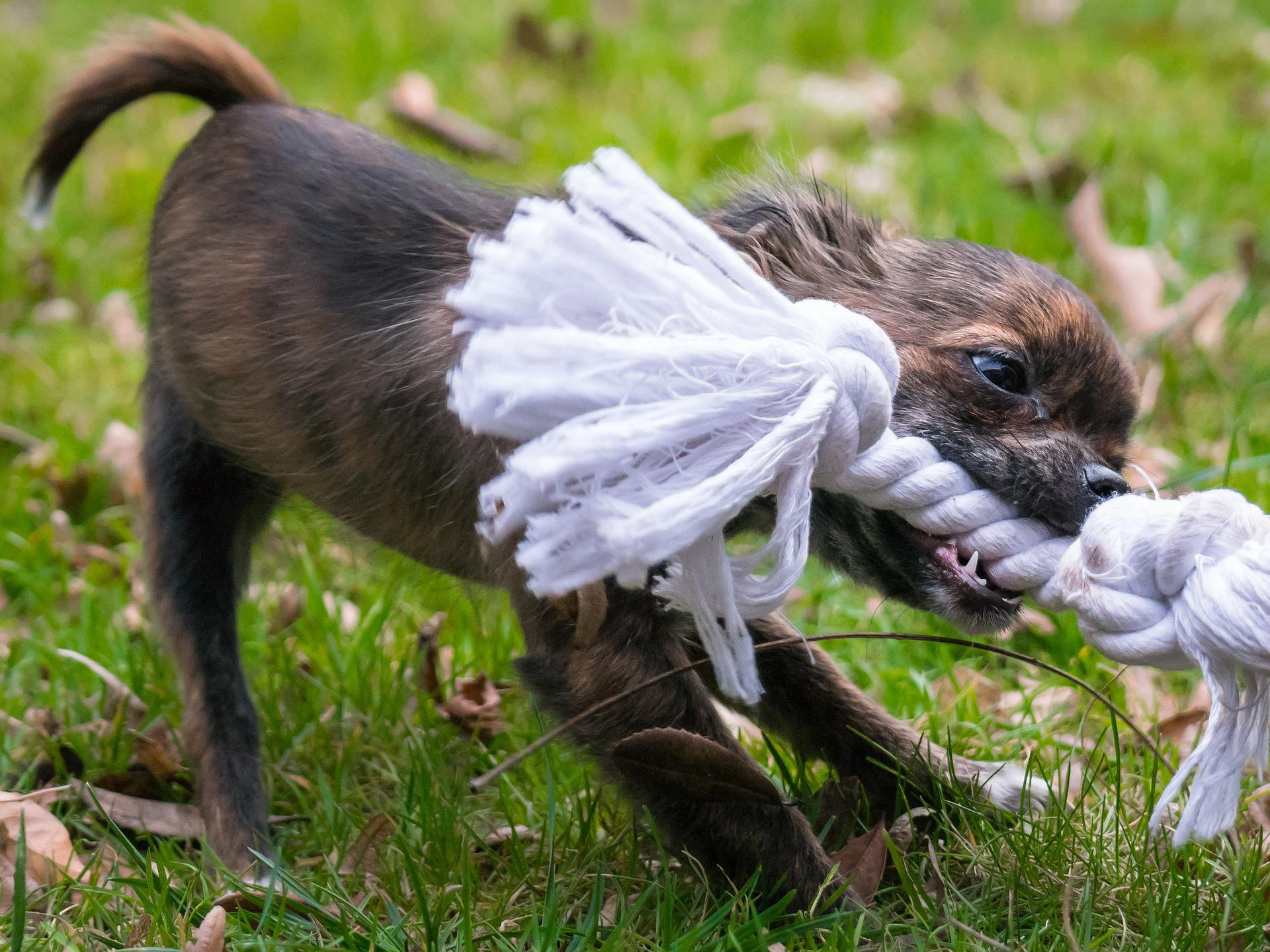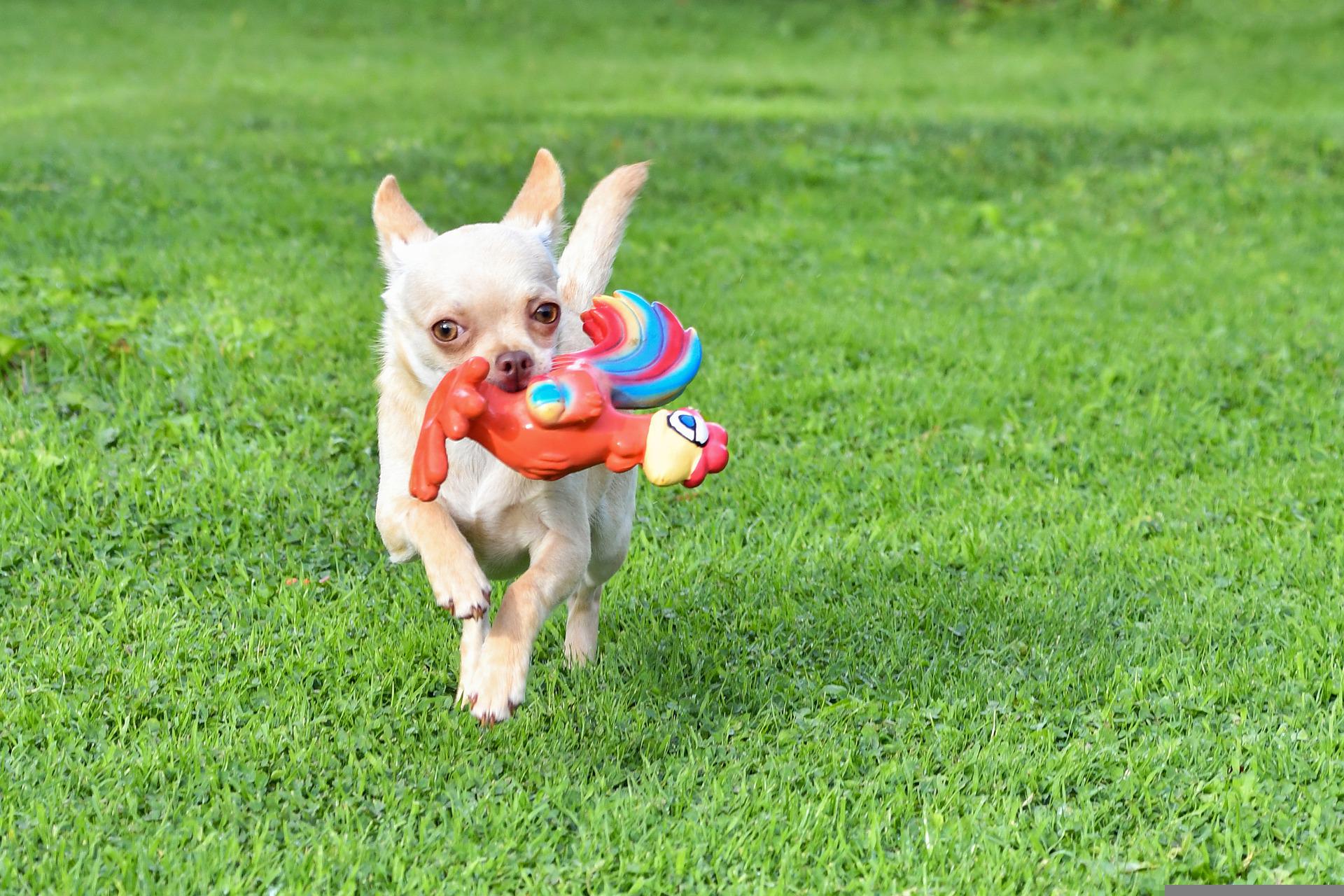Chihuahuas are the smallest breed of dog known for their large eyes, pointy ears, and aggressive personalities. These pint-sized pups may be small but can pack a powerful punch. But how strong is a Chihuahua bite? Let’s investigate the Chihuahua bite to find out.
The Average Bite Force of a Chihuahua

Chihuahuas are small dogs, but did you know that they also have the strongest bite strength in the canine world? Studies have shown that Chihuahuas have an average bite force from 50-150 PSI (pounds per square inch).
The average human bite force is only about 150 PSI. So why do Chihuahuas have such powerful jaws? One theory is that their strong jaw muscles may be an adaptation for killing prey.
Another possibility is that their small size makes it necessary for them to exert more force to eat appropriately. Whatever the reason, there’s no denying that these pint-sized pups pack a serious punch.
Measuring the Strength of a Chihuahua Bite
While Chihuahuas are rarely notorious for biting, there are occasions when they may need to protect themselves – or their owner. So, how can you measure the strength of a Chihuahua’s bite? There are a few different ways to do this.
- Bite Force Meter (BFM): This tool measures the amount of force exerted by the jaw muscles when the dog bites down. These measurements compare to those of other dogs, providing a more accurate way to assess the strength of a Chihuahua bite.
- Bite Sleeve: This is placed over the arm and allows the dog to bite down. The amount of pressure exerted by the jaws is then measured.
- Jaw Pressure Test: This test measures the pressure the jaws can exert. Although it isn’t as popular as the other two methods, it’s still an excellent way to get an idea of how strong a Chihuahua’s bite is.
- Bite Stick: The Chihuahua will have this apparatus placed into its mouth and be encouraged to bite down. The amount of pressure required to activate the device is measured.
How Strong Is a Chihuahua Bite: Factors That Affect Chihuahua Bite Strength

Chihuahuas are famously feisty little dogs with the strongest bite to match their attitude. But how much force can these pint-sized pups pack? It turns out that numerous factors can affect a Chihuahua’s bite force, including:
➤Body Size
Despite their small size, Chihuahuas are notorious for their fierce loyalty. But many people don’t realize that Chihuahuas also have one of the strongest bites relative to their body size.
Research has shown that Chihuahuas have a bite force that is five times stronger than that of a human adult. It’s likely due to their small size, so their teeth are closer together and can apply more pressure.
And while their small size may make them seem harmless, potential victims should beware: a Chihuahuas bite can do severe damage, even if it doesn’t break the skin. So, next time you meet a Chihuahua, remember to treat them with respect – they may be tiny, but don’t underestimate them.
➤Age
Research shows a direct connection between a Chihuahua’s age and its bite’s severity. In general, younger Chihuahuas tend to have stronger bites than older ones.
It is likely because younger Chihuahuas have more highly developed muscles, are more active, and are more likely to resort to aggression when feeling threatened.
On the other hand, older Chihuahuas may not physically be as strong and less inclined to use aggression as self-defense. Instead, they may prefer to use their voices to warn off potential threats.
➤Gender
Studies have shown a difference in bite strength between male and female Chihuahuas. In general, males tend to have stronger bites than females.
This difference may be due to one of several factors. One possibility is that males tend to be larger and more muscular than females and thus can exert more force with their bites.
Another possibility is that males may be more likely to resort to aggression than females and thus may have had more opportunities to practice using their teeth as weapons. Whatever the reason, it’s clear that male Chihuahuas tend to have more substantial bites than females.
➤Diet
The Chihuahua diet is one factor that affects bite strength. Puppies receive their first set of teeth around three to four months of age. By six months, they should have a complete set of adult teeth. The diet during this time must support the growth and development of strong teeth and bones.
Adult Chihuahuas should have a diet that helps to maintain their oral health. It includes crunchy foods that help remove plaque and tartar buildup from teeth.
The diet also needs to provide the right balance of nutrients for overall health. Various healthy food options are available for Chihuahuas, so work with your veterinarian to find the best diet for your dog.
➤Training
Chihuahuas are hunting dogs, despite the common misconception that they make good lapdogs. They have an instinct to use their teeth as weapons.
Fortunately, one can learn to master this instinct with the proper training. Chihuahuas that have adequately socialized and trained are significantly less likely to resort to aggressive behavior and, consequently, are considerably less likely to bite.
So, if you’re considering getting a Chihuahua, be sure to find a responsible breeder who can provide you with a properly trained and socialized dog. It will help ensure that your Chihuahua is less likely to bite, even if it feels threatened.
Reasons Why a Chihuahua May Bite

Numerous reasons why a Chihuahua may bite. Some of the most common reasons:
📌Fear
Chihuahuas, like all animals, can sense when something is wrong and when they are in danger. If a Chihuahua feels threatened, it may lash out to protect itself.
This behavior is especially common in Chihuahuas that lack socialization or have a history of negative interactions with people in the past. In order to prevent your Chihuahua from biting out of fear, it is essential to socialize it early and ensure it always feels safe and secure.
📌Pain
If a Chihuahua dog is in pain, it may bite to get the person or animal, causing the pain to stop. Injuries or illnesses of the Chihuahua are the most likely causes of this occurrence.
For example, if you accidentally step on your Chihuahua’s paw, it may bite out of reflex. Or, if your Chihuahua is ill or injured, it may bite out of frustration or because it’s in pain.
If you think your Chihuahua may be in pain, it’s important to take it to the veterinarian as soon as possible.
📌Possessiveness
Chihuahuas can be very possessive of their food, toys, and even their owners. A Chihuahua can bite in self-defense if it senses its owner is in danger.
Other dogs, animals, and strangers might cause possessive behavior. While it is important to socialize with your Chihuahua from an early age, it is also critical to be aware of the potential for aggression and to take preventative measures.
📌Frustration or Excitement
When a Chihuahua attempts to gain attention or access an object it wants are repeatedly unsuccessful; the dog may become frustrated and resort to biting as an outlet for that anger. Similarly, a Chihuahua overexcited by playing or petting may bite as part of its enthusiastic response.
In either case, training a Chihuahua not to bite is crucial, as even gentle nips can cause pain and damage. Most Chihuahuas can learn to control their biting impulses with consistent training and positive reinforcement. However, owners should always be cautious around unfamiliar dogs, as even the friendliest dog may bite if it feels threatened or frightening.
📌Teething
Chihuahua puppies undergo teething, which is when their adult teeth come in and replace their baby teeth. During this time, puppies will often bite or chew on objects to relieve the discomfort caused by their new teeth. Unfortunately, this frequently results in bites or nips, mainly if the puppy has no training in the proper techniques for inhibiting its bite.
Fortunately, there are some ways to help prevent your Chihuahua from biting during teething. Providing chew toys and bones can help redirect your puppy’s chewing instinct, and teaching them proper bite inhibition can help prevent accidental bites or nips.
What Can Happen if a Chihuahua Bites Someone
While Chihuahuas are one of the smallest breeds of dogs, they can still pack a powerful punch – particularly when it comes to their teeth. Because of their diminutive size, many people underestimate the potential for harm that a Chihuahua bite can cause. However, these dogs have surprisingly strong jaws, and their bites can do serious damage.
Dog bite injuries are responsible for a significant number of trips to the emergency room each year. While most Chihuahua bites are relatively minor, they can still cause serious injury. The danger with these bites is that they often occur on the face or hands, leading to infection or even permanent scarring.
In some cases, a Chihuahua bite can even puncture an artery, which can be life-threatening. As a result, it is important to be careful around these dogs, even if they seem harmless. If a Chihuahua bites you, it is crucial to seek medical attention immediately.
Things to Do if a Chihuahua Bites You

If you are unfortunate enough to be bitten by a Chihuahua, you should do a few things.
✔️Remain Calm
After receiving a bite, it is vital to remain calm to avoid further injury. If the Chihuahua is still biting, gently pry its jaws with your fingers. Do not try to pull away from the Chihuahua, as this could cause additional damage.
✔️Clean the Wound
Once you have freed yourself from the Chihuahua’s jaws, cleaning the wound as soon as possible is important. It will help to prevent infection and further damage. Gently rinse the wound with warm water and soap, then apply a bandage.
✔️Seek Medical Attention
Though the wound seems minor, it is critical to seek medical attention as soon as possible. A doctor will be able to clean and dress the wound properly and will also be able to check for any signs of infection. In some cases, a tetanus shot may also be necessary.
✔️Report the Incident
If a Chihuahua has bitten you, it is important to report the incident to the proper authorities. It will help ensure that the dog is up-to-date on its vaccinations and does not pose a danger to others.
Tips for Preventing Chihuahua Bites
You can do numerous things to prevent being bitten by a Chihuahua.
Do not approach unfamiliar Chihuahuas: It is important to be cautious around any strange dog, as even the friendly ones can bite if they feel threatened. If this is your first time meeting a Chihuahua, you should wait until the dog has finished sniffing you before petting it. And always ask the owner’s permission before petting any dog.
Don’t provoke the Chihuahua: Chihuahuas, like any other dog, can become defensive if they feel threatened. As a result, it is critical to avoid provoking them. It includes pulling their tails or ears and teasing them with food. If a Chihuahua does become agitated, it is essential to back away slowly and avoid making any sudden movements.
Supervise children around Chihuahuas: Children should always be supervised around dogs, as they may not understand how to interact with them properly. It is especially true for Chihuahuas, as these dogs are small and delicate. Children should never be left alone with a Chihuahua, as even the most well-behaved child can accidentally hurt the dog.
Do not disturb sleeping or eating Chihuahuas: Chihuahuas, like any other animal, require rest and should not be disturbed while sleeping or eating. It can agitate the dog and lead to a bite. If you must wake a sleeping Chihuahua, do so gently and calmly. In addition, you should never attempt to take food away from a Chihuahua while it is eating because this can also result in a bite from the dog.
Be cautious around aggressive Chihuahuas: Some Chihuahuas may be naturally aggressive, so you should exercise caution around them. If a Chihuahua is growling, barking, or snapping, it is best to keep your distance. These dogs may bite if they feel threatened, so it is best to be cautious.
Never leave a Chihuahua unsupervised: Chihuahuas are more likely to display aggressive behavior when left unattended for extended periods. If you must leave your Chihuahua alone, be sure to crate or pen them in a safe area.
Keep your Chihuahua up-to-date on vaccinations: It is important to keep your Chihuahua up-to-date on all of its vaccinations. It will assist in disease prevention and protect the dog from other health issues.
Spay or neuter your Chihuahua: Chihuahuas spayed or neutered are less likely to bite than those not. It is because the surgery helps to reduce aggression and territorial behavior. If you plan on getting a Chihuahua, have it spayed or neutered as soon as possible.
Frequently Asked Questions
Q. How many teeth does a Chihuahua have?
Most Chihuahuas have complete dental sets consisting of 42 teeth. It includes 16 incisors, 10 premolars, 4 canines, and 12 molars (3 on each side of the upper jaw, 2 on each side of the lower jaw). However, some Chihuahuas may miss one or more teeth due to poor nutrition, genetics, or injury. In addition, teething puppies may lose their baby teeth before adult teeth replace them. As a result, the average number of teeth for a Chihuahua can vary somewhat.
Q. Is death possible from a Chihuahua bite?
While a Chihuahua bite is unlikely to be fatal to a healthy adult human, it could pose a serious threat to a small child or an older adult with weak bones. In addition, a Chihuahua’s teeth are sharp and pointy, which makes their bites particularly likely to puncture the skin and cause bleeding. As a result, it is important to exercise caution when around Chihuahuas, even if they seem friendly.
Q. Is Chihuahua have rabies?
Like all mammals, they are susceptible to the disease, but their small size makes them less likely to be exposed to the virus. In addition, their typically timid nature means that they are less likely to come into contact with wild animals who may be carrying the virus.
However, there have been isolated cases of rabies in Chihuahuas, so it is important to take precautions to protect your pet. Vaccination is the most beneficial way to prevent rabies, which is why all dogs must receive their shots according to a schedule established by their veterinarians. If you believe your Chihuahua has been exposed to rabies, seek medical help immediately and quarantine your pet until you can get a diagnosis.
Q. Can a Chihuahua kill a human?
Chihuahuas are the smallest dog breed and are fiercely loyal to their owners. However, some people believe that Chihuahuas can also kill a human. While it is true that Chihuahuas may bite people, no evidence suggests that they are more dangerous than other breeds of dogs.
In fact, most Chihuahuas are gentle and loving creatures that pose no threat to humans. While a Chihuahua dog may bite someone hard enough to cause serious injury, it is unlikely that a Chihuahua will ever kill a human.
Q. Is it simple to train a Chihuahua?
Chihuahuas are intelligent, playful, and can bond closely with their owner. However, Chihuahuas can also be stubborn and willful, making them challenging to train. Like all dogs, Chihuahuas need plenty of patience, positive reinforcement, and consistent training to learn new tricks and behaviors. With time and effort, almost anyone can train a Chihuahua to do tricks, behaviors, or commands.
Chihuahuas are one of the world’s most popular dog breeds, and it’s easy to see why. They are small, affectionate dogs that bond closely with dog owners. Chihuahuas are also known for their unique personalities; many people find them charming and amusing companions.
Q. Does Chihuahua like being cuddled?
Yes. Chihuahuas do enjoy cuddling. They often seek out affection from their owners. Chihuahuas are natural lap dogs, and they love nothing more than snuggling up close. They also enjoy having their ears scratched and petted.
However, it’s important to remember that every dog is different. It’s possible that some Chihuahuas are more reserved than others and don’t enjoy being petted or cuddled as much as others do.
Q. How is the Chihuahua bite force compared to other dog breeds?
Regarding bite force, not all dog breeds are created equal. For example, the American Pit Bull Terrier has a bite force of 235 PSI, while the Chihuahua’s is only around 50 PSI. However, it’s important to remember that bite force is just one factor that determines a dog’s overall aggression. Other factors, such as energy level and training, can also play a role. Generally, the strongest biting dogs are those with large jaws and strong muscles, such as the Labrador retriever, American pitbull, and the English mastiff. But regardless of their size or strength, all dogs have the potential to cause serious harm if they are not trained and socialized.
Conclusion
Chihuahuas might be tiny, but that doesn’t mean they can’t pack a punch. The average Chihuahua bite force psi is pretty strong and can easily cause pain or injury if you aren’t careful. So, next time you meet a Chihuahua, respect their powerful little jaws!
Have you ever been on the receiving end of a Chihuahuas bite? Tell us about your experience in the comments.
Here at ILoveChihuahua, we share our personal experiences as owners of this feisty breed. We talk about recommended methods, dog supplies picks, and advice on common Chihuahua problems. Our goal is to promote responsible dog ownership, so there would be fewer Chihuahuas in shelters.


